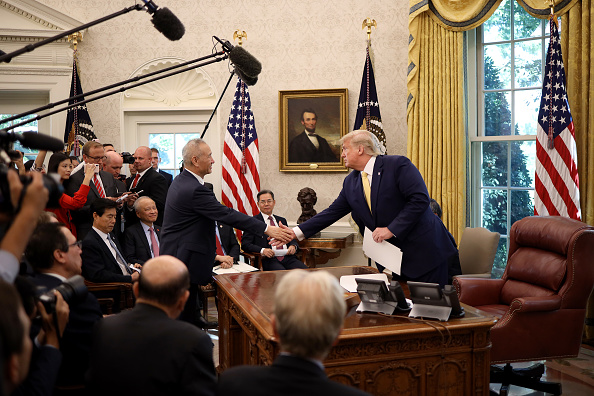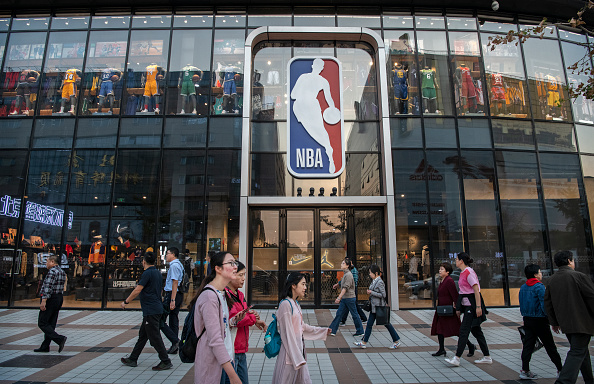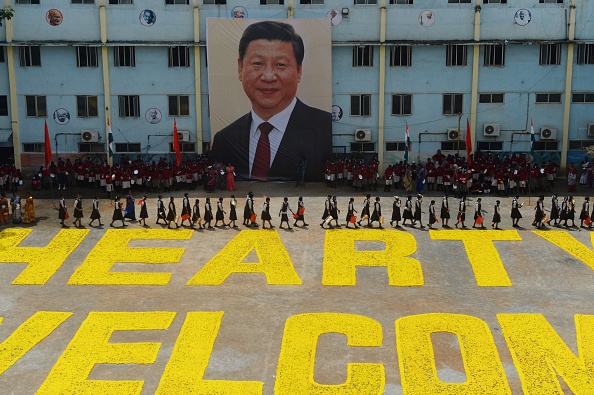
 A "Big Day of Negotiations"
A "Big Day of Negotiations"
US and Chinese trade negotiators reached a 'phase one' agreement in deescalating the ongoing trade war, President Trump told reporters at the White House today. The soft agreement comes after China's top negotiator, Vice Premier Liu He, held meetings with the US delegation and met with President Trump one-on-one in Washington D.C., marking the first senior-level in-person talks since late July.
The initial trade pact includes China's agreement to make a $40 billion to $50 billion purchase of US agricultural goods and to further open its economy to foreign business, an issue which has long been a concern to the American business community. In return, the US will hold off on raising tariffs next week. The two sides also discussed intellectual property rights and currency manipulation, although it's not yet known if an agreement was reached on those sticking points.
The 18-month trade war has exacted a huge toll on the global economy and US manufacturing, but China's yuan rallied on the news that a currency pact may be included in a "mini" trade deal, leaving the more controversial issues to a later date. The US remains adamant that China must crack down on intellectual property theft, and loosen requirements for American companies to hand over commercial secrets in order to do business in China.
The initial agreement is expected to be finalized within three to five weeks, according to President Trump's comments today. US Treasury Secretary Steven Mnuchin, meanwhile, cautioned, "There is a significant amount of work to do."
 Houston, We Have a Problem
Houston, We Have a ProblemThe NBA had a tough week in China, its most profitable market, when the Houston Rockets general manager Tweeted a message in support of the Hong Kong protests. Although the Tweet was quickly deleted, the message prompted a huge outcry on Chinese social media and led to dozens of Chinese partners cutting commercial ties with the NBA, including sportswear brands and streaming services. CCTV and Tencent Sports announced they would no longer broadcast Rockets games.
After drafting Shanghai-born future All-Star Yao Ming in 2002, the Houston Rockets grew to be one of China's most popular teams. "The Rockets were like our national home team," said one fan, a basketball coach in Beijing. But after news of the GM's tweet spread, Chinese basketball fans seem to be choosing loyalty to their country over loyalty to their team, putting billions of dollars at stake for the NBA.
Attempting a clean-up effort, the NBA called the tweet "regrettable" in a public statement, but a bipartisan chorus of Washington lawmakers hit back against the NBA in a letter to NBA commissioner Adam Silver, accusing the professional league for valuing profits over freedom of speech.
The event has shined a light on what many American companies report to be "economic bullying" in China, the cost of doing business in the world's second largest market. But China's economy is still growing, and international businesses need to please what some are calling increasingly nationalist Chinese consumers to make profits.
"I am a basketball fan," one netizen wrote about the incident, "but I am a Chinese citizen first."
 Frenemies
FrenemiesChina is balancing a tricky triangular relationship this week with Pakistan and India, seen by Beijing as an all-weather friend and strategic rival, respectively. Meeting separately, Chinese President Xi Jinping sat down with Indian Prime Minister Narendra Modi and Pakistani Prime Minister Imran Khan to discuss thorny issues such as border disputes and trade flows.
Among the major agenda items is the Kashmir crisis, a disputed territory where tensions are running high after India downgraded Indian-administered Kashmir's status in August, angering Pakistan and China and potentially triggering a mass Hindu migration to the Muslim-majority area. During his meeting with Imran Khan, Xi voiced support for Pakistan's "independent sovereignty and territorial integrity" in the region, prompting India to call on China to refrain from making "[comments] on the internal affairs of India." The two allies also discussed restarting the contentious China-Pakistan Economic Corridor (CPEC), a multi-billion dollar infrastructure project part of China's Belt and Road Initiative. Since Khan's election, CPEC has been unpopular in Pakistan, according to China-US Focus contributor Adnan Aamir. Read more about the challenges facing CPEC on China-US Focus.
Meeting in southern India today, strategic rivals Chinese President Xi Jinping and Indian Prime Minister Narendra Modi discussed the India-China trade imbalance and India's warming relationship with the United States, but reportedly steered clear from the topic of Kashmir, according to the Hindustan Times. China and India have a historically rocky relationship, but as China looks to cushion the impact of US tariffs and its slowing economy, it may turn to India for economic support. With a shared border, two of the world's largest economies, and three of the world's nuclear powers, China, Pakistan, and India are inextricably bound in complication.
Prepared by China-US Focus editorial teams in Hong Kong and New York, this weekly newsletter offers you snap shots of latest trends and developments emerging from China every week, while adding a dose of historical perspective.
- 2019-10-04 Birthday Celebrations
- 2019-09-28 A World Split in Two?
- 2019-09-20 Another Round
- 2019-09-13 Olive Branch or Olive Twig?
- 2019-09-07 The Unwinnable War?
- 2019-08-31 “Sorry, it’s the way I negotiate”
- 2019-08-23 Tit for Tat
- 2019-08-17 Slowdown Ahead?
- 2019-08-09 Yuan on the Rocks
- 2019-08-02 Ratcheting Up the Crisis
- 2019-07-26 Playing Defense
- 2019-07-19 “Stain of the Century”
- 2019-07-12 Whichever Way the Wind Blows
- 2019-07-04 A Gentlemen’s Agreement
- 2019-06-28 A Truce on the Horizon?
- 2019-06-22 Three’s A Crowd
- 2019-06-14 Battle for Hong Kong
- 2019-06-07 Panda Diplomacy
- 2019-05-31 Trade Diversions
- 2019-05-25 Farm Aid or Band Aid?
